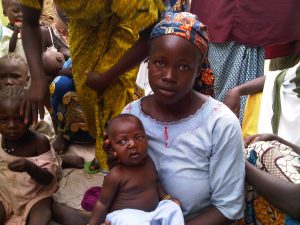Maternal & Newborn Health

Nigeria is Africa’s most populous country, with 148 million inhabitants in 2007, 25 million of them under age five. With almost 6 million births in 2007 – the third highest number in the world behind India and China – and a total fertility rate of 5.4, Nigeria’s population growth continues to be rapid in absolute terms. Every single day, Nigeria loses about 2,300 under-five year olds and 145 women of childbearing age. This makes the country the second largest contributor to the under–five and maternal mortality rate in the world.
Underneath the statistics lies the pain of human tragedy, for thousands of families who have lost their children. Even more devastating is the knowledge that, according to recent research, essential interventions reaching women and babies on time would have averted most of these deaths.
Although analyses of recent trends show that the country is making progress in cutting down infant and under-five mortality rates, the pace still remains too slow to achieve the Millennium Development Goals of reducing child mortality by a third by 2015.
Preventable or treatable infectious diseases such as malaria, pneumonia, diarrhoea, measles and HIV/AIDS account for more than 70 per cent of the estimated one million under-five deaths in Nigeria.
Malnutrition is the underlying cause of morbidity and mortality of a large proportion of children under-5 in Nigeria. It accounts for more than 50 per cent of deaths of children in this age bracket.
The deaths of newborn babies in Nigeria represent a quarter of the total number of deaths of children under-five. The majority of these occur within the first week of life, mainly due to complications during pregnancy and delivery reflecting the intimate link between newborn survival and the quality of maternal care. Main causes of neonatal deaths are birth asphyxia, severe infection including tetanus and premature birth.
Similarly, a woman’s chance of dying from pregnancy and childbirth in Nigeria is 1 in 13. Although many of these deaths are preventable, the coverage and quality of health care services in Nigeria continue to fail women and children. Presently, less than 20 per cent of health facilities offer emergency obstetric care and only 35 per cent of deliveries are attended by skilled birth attendants.
This shows the close relationship between the well being of the mother and the child, and justifies the need to integrate maternal, newborn and child health interventions.
Ref: UNICEF Nigeria